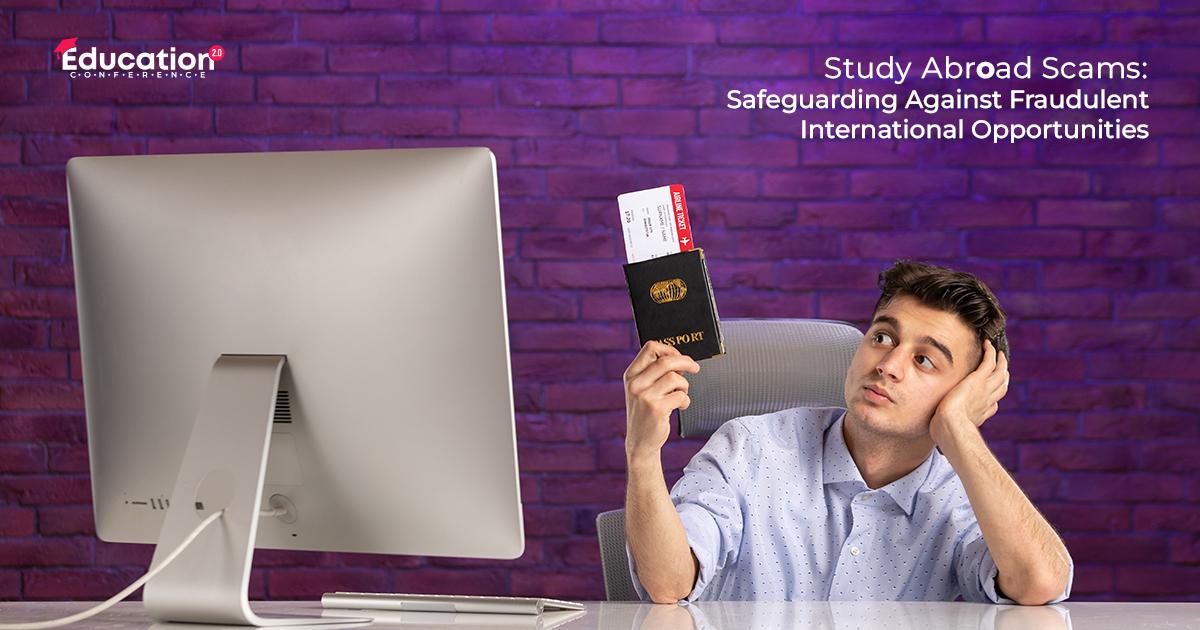Studying abroad can be a life-changing experience, but it's essential to be aware of potential scams that could tarnish your educational journey. In this blog, we will discuss the key red flags highlighted by experts at leading education events like the Education 2.0 Conference that you should watch out for when evaluating study abroad programs.
Identifying Scam Offers
Below are some key points that you should look out for when you come across a suspicious study abroad scam offer.
-
Unbelievable Offers And Promises
- Scam programs often make enticing promises, such as "guaranteed scholarships" or "100% acceptance rates." Be skeptical of any offer that sounds too good to be true.
- Legitimate study abroad opportunities have competitive admission processes and may not offer free rides to everyone.
-
Lack Of Accreditation
- Accreditation is a crucial factor when choosing a study abroad program. If an institution or program is not accredited, it may not meet the necessary academic standards.
- Verify the accreditation status of the institution and program through reputable sources like the US Department of Education or relevant local authorities.
-
Limited Or Vague Information
- Scam programs often provide minimal information about their offerings, faculty, and facilities. They may not have a physical presence or verifiable contact details.
- Insist on detailed program information, including course offerings, faculty credentials, and campus facilities. Legitimate programs will readily provide this information.
-
Pressure To Act Quickly
- Be cautious of programs that push you to make quick decisions, often accompanied by threats of missed opportunities.
- Legitimate study abroad opportunities allow you time to research and make an informed decision without pressure.
Verify The Legitimacy Of Educational Consultants
Many students rely on educational consultants to guide them through the study abroad application process. However, not all consultants are trustworthy. Here, we'll explore what expert reviews at education events suggest to ensure the offers have your best interests at heart.
-
Check Their Credentials
- Verify the educational consultant's qualifications and affiliations with recognized professional organizations.
- Look for consultants with experience guiding students through legitimate study abroad programs.
-
Ask For References
- Request references from past clients to gauge their satisfaction with the consultant's services.
- A reputable consultant should be willing to provide references and showcase their successful cases.
-
Beware Of High Commissions
- Some consultants receive commissions from specific institutions for recruiting students. While this is not inherently wrong, be cautious if they push you towards programs solely because of high commissions.
- Ensure that the consultant prioritizes your academic and personal goals rather than their financial gains.
-
Transparent Fees
- A trustworthy consultant should be clear about their fees and services. Avoid consultants who hide fees or provide vague cost estimates.
- Get a written agreement detailing all fees and services to avoid later surprises.

Conducting Due Diligence On Study Abroad Providers
When selecting a study abroad program, conducting thorough due diligence is crucial. Education conferences in 2024 have streamlined their agenda to outline the steps you should take to ensure the legitimacy of the program you are considering. Here are some essential ones:
-
Research The Institution
- Investigate the reputation of the institution offering the program. Look for reviews, testimonials, and feedback from previous students.
- Verify the institution's history, accreditation, and recognition in the academic community.
-
Contact The Admissions Office
- Reach out to the program's admissions office with your questions and concerns. Legitimate programs will have responsive and helpful staff.
- Ask about admission criteria, application processes, and any additional documentation required.
-
Review The Program's Website
- Examine the program's official website for comprehensive and up-to-date information. Legitimate programs invest in maintaining an informative online presence.
- Look for program details, faculty bios, contact information, and admission requirements.
-
Seek Guidance From Advisors
- Consult your school or university's study abroad advisors for recommendations and insights.
- Advisors can help you identify reputable programs and steer you away from potential scams.
Reporting Suspected Scams And Protecting Others
If you encounter a potential study abroad scam or believe you have fallen victim to one, it's essential to take action. In addition to identifying bogus work and internship scams, it is also important to know what actions to take to protect yourself from study abroad scams. Here is what you can do accordion to Education 2.0 Conference experts:
-
Report To Authorities
- If you suspect a scam, report it to relevant authorities, such as your country's education department or a local consumer protection agency.
- Providing information can help prevent others from falling victim to the same scam.
-
Inform Your Educational Institution
- Share your experience with your school or university's study abroad office.
- They may offer support and guidance on how to proceed and prevent similar incidents.
-
Warn Others
- Use social media, forums, and student communities to share your experience and warn others about potential scams.
- Your honest reviews may help prevent others from making the same mistake.
-
Seek Legal Recourse
- If you have incurred financial losses due to a study abroad scam, consider seeking legal advice.
- An attorney with expertise in consumer protection may help you recover your losses.
Conclusion
Safeguarding against fraud study abroad opportunities requires vigilance, research, and verification. By recognizing red flags, vetting educational consultants, conducting due diligence on study abroad providers, and taking action against scams, you can protect yourself and others from falling victim to study abroad fraud.
Your educational journey should be enriching and safe, and with the right precautions, you can make it a reality. You can ensure this by attending leading education conferences 2024 like the Education 2.0 Conference.














